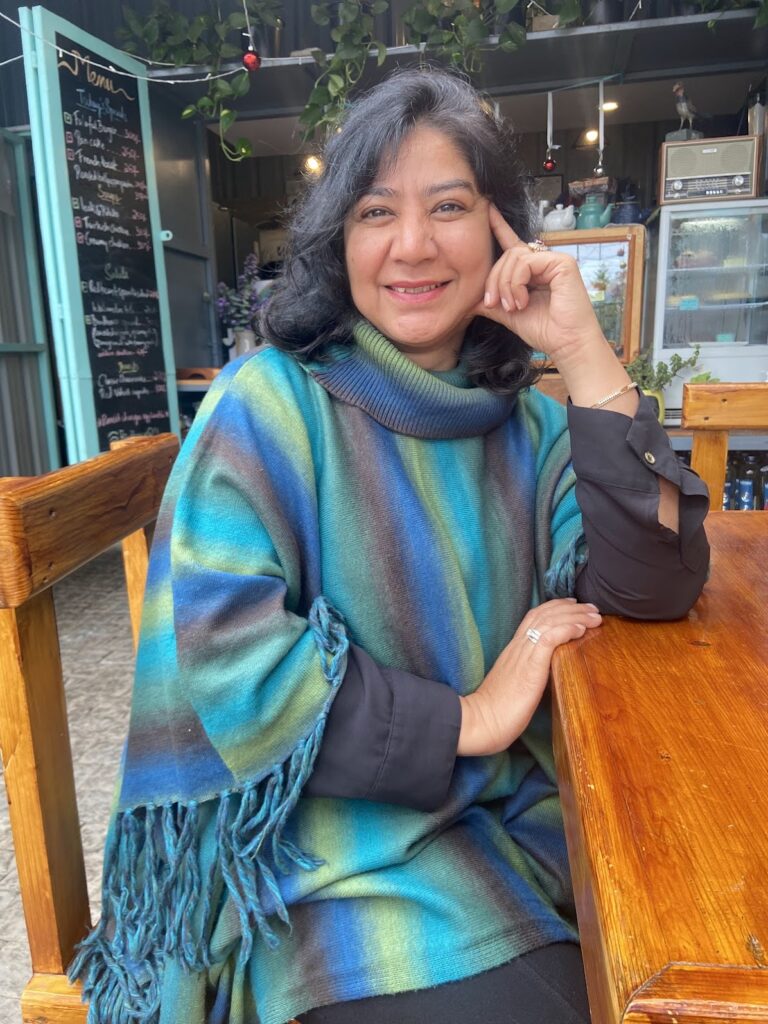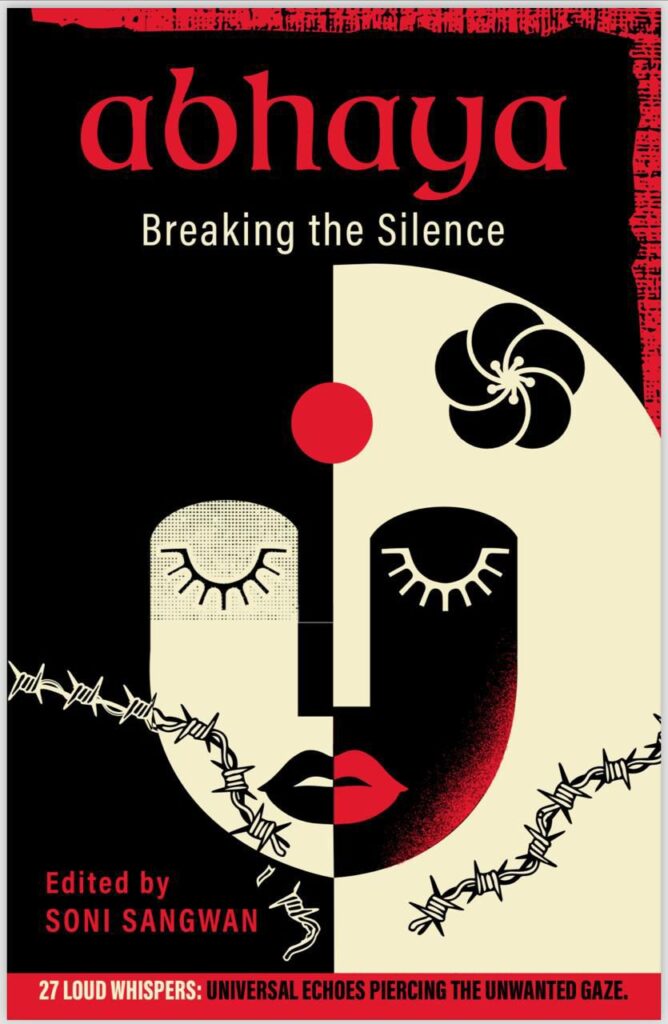It was during Navratri, the nine days dedicated to Goddess Durga, that Abhaya: Breaking the Silence took shape. The anthology, featuring contributions from 27 women, was born out of the anguish we all felt when a young doctor was brutally raped and murdered in Kolkata in the month of August 2024.
The incident filled me with a deep sense of anger and helplessness – anger that we, as a society, react to sexual crimes against women only when the brutality touches a nadir and makes headlines; and helplessness that I can only watch from the sidelines and do nothing about it.
Conversations with other women like me – Monika Kacker, an educationist and story-teller and Ganiv Panjrath, an author and publisher – laid the foundation for Abhaya: Breaking the Silence. We all agreed that while we may not be able to change what has already happened, we can at least begin the conversation about sexual crimes that we all face in our daily lives.

The concept was simple: if we start openly discussing molestations on public transport, the flashing on the streets, the abuse at home, and the harassment at work— experiences many of us have endured—perhaps we can create a safer world for the next generation.
As we shared the idea with like-minded women – many of them first-time writers – our tribe grew from three to 27. Each of us broke the silence about incidents that had happened to us or to someone close to us. Each writing in Abhaya: Breaking the Silence comes straight from the heart – raw yet resonant, with emotions that will deeply connect with every reader.
Monika Kacker’s article The Mission Colours sets the tone for the book. She writes about why the colors of the Indian festival of colors – Holi – hold no meaning for her anymore; why she can no longer enjoy poori-bhaji and why her mother’s gift to her when she began to travel on public transport was a safety pin.
The book includes articles, poems, essays, and short stories in both English and Hindi. Each word of Manju Ahlawat’s heartbreaking poetry in Hindi, accompanied by English commentary, will shake you to the core. When Shivali Ranaut writes about cousins inviting you to play a “new game,” a landlord who hugs you too tightly, or an uncle making you sit on his lap for just a bit too long, you’re forced to question why these crimes remain unspoken.
In my article, Growth Milestones, I reflect on my own journey to womanhood through incidents that marked different stages of my life, and I express my hope that my daughter’s journey will be different. I recount an interaction with Dr. APJ Abdul Kalam, then President of India, when I asked him to institute a zero-tolerance policy for gateway crimes against women to prevent their escalation into more heinous forms. But I also write about the remorse I still feel for not reporting a doctor who tried to kiss me in his office when I went to meet him for a story as a reporter.
If I were to Choose by Neha Tiwari tells the heart-breaking story of a young girl begging her mother not to go to work as her caregiver is a predator. Ganiv Panjrath’s article Betrayal takes the reader through the role a mother or any other sympathetic adult can play to help a child overcome fear and guilt when they are betrayed by those they trust. Champaka Lakshman’s short story Kintsugi Bowl – The Golden Joinery builds on the theme of betrayal when a child is abused by someone they trust.

In The Image of a Woman: A True Story, Fiona Thomas delves into societal perceptions surrounding her youth as a child of a broken marriage and the idea of a ‘good girl,’ weaving her narrative with references to Lilith, Adam’s first wife and a feminist icon. Dr. Kirti Sinha Ranjan writes about how powerful women in science have historically faced character attacks by insecure men, drawing parallels to the harassment faced by women scientists today.
The lasting impact of trauma is poignantly expressed in an evocative poem by Col (Dr.) Karuna Datta, a sleep specialist, who tells the story of her patients who come to her for a cure for insomnia. On digging deeper, she finds, for instance, that for a septuagenarian, it is the ghosts of the violence of 1947 when India was partitioned, that are keeping her awake.
All the contributions came to me for editing on the first day of Navratri and with the guidance of Shakti, we were able to design the cover, do the layout and send the manuscript to the printer on the ninth day of the festival, the day dedicated to the ninth form of Durga – Maa Siddhidatri. Symbolically, she is the goddess of spiritual attainment and liberation. This is also the day when devotees perform kanya pujan or worship of girls. We got the first copies back from the printers on Diwali.
Abhaya: Breaking the Silence was launched on November 8, 2024, and followed by book readings across various locations where contributors reside. Simultaneous events in Wellington, Tamil Nadu, and Gopalpur, Odisha, on November 28th, coincided with the UN-designated 16 Days of Activism against Gender-Based Violence. The 2024 theme, Unite to End Violence Against Women, echoed the very purpose of the anthology.
The events were more than just book reading sessions, they are the beginning of a conversation, titled – Catharsis: Experience Sharing and Book Reading with the writers of Abhaya: Breaking the Silence… join the Conversation. At both venues, women and men in the audience participated wholeheartedly and as the writers spoke about their writings, they too took the mike and shared their own experiences for a truly cathartic experience.
The event was hosted by my 14-year-old daughter, Sonakshi, and her friends. As they welcomed guests, they expressed their hope that the conversation would continue—so their generation doesn’t have to endure what their mothers did.
As my 83-year-old mother, Sumitra Sangwan, sat in the audience, she too recalled her university days when trips to the crowded markets in Nai Sarak in Delhi to buy their college books would leave them bruised and hurt as strangers would molest them. This cross-generational connect was heartbreaking in its own way as while it connected three generations, it brought home the need for the link to be broken. Borrowing the title of the bestseller about domestic abuse by Colleen Hoover, ‘It Ends with Us.’
Abhaya: Breaking the Silence is just the beginning. We hope it grows into a movement, fostering regular conversations, shared experiences, and a community of hope and support.
The book is available on https://www.amazon.com/dp/9391526756 https://www.amazon.co.uk/dp/9391526756
Disclaimer: The opinions and views expressed in this article/column are those of the author(s) and do not necessarily reflect the views or positions of South Asian Herald, its editorial team, or its affiliates. South Asian Herald does not endorse any opinions or statements made within the content.






